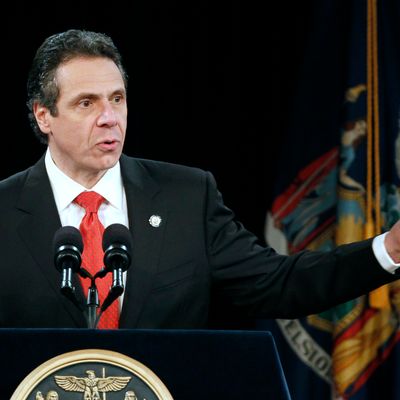
Cornball comedy is becoming a staple of Andrew Cuomo’s State of the State speeches. In his 2012 edition on Wednesday, there were Powerpoint renderings of legislative leaders Shelly Silver and Dean Skelos as tykes in short pants. Then there was Cuomo saying, with a wink, that he was shocked, shocked to discover that every player in the education game has a lobbyist — except for (cue the violins) the children, who would henceforth be represented by the governor himself. Bitterly funny, though, was that his two boldest economic development proposals — a giant convention center in Queens and more gambling all over the state — would enrich a company that plays the old-fashioned inside-politics game deftly, spreading around campaign contributions and stocking up on well-connected middlemen. Genting, the Malaysia-based company that runs the new Aqueduct “racino,” has spent $1 million annually on at least six New York lobbyists, including Pat Lynch, a former top aide to Silver, and John Cordo, a former state senate Republican staffer. For public relations assistance, Genting employs SKD Knickerbocker, whose principals include current and former advisors to City Council speaker Christine Quinn, Mayor Michael Bloomberg, and the governor himself.
Cuomo’s Empire State Development Corporation signed a “non-binding” agreement with Genting for the convention center site without any public process, which is one way to avoid the kind of scandal that engulfed Governor David Paterson’s attempts to revitalize the area around the Queens racetrack. The current governor insists his motivation is “jobs, jobs, jobs,” and no doubt he’s sincere, choosing these projects without any contact or encouragement from Genting’s lobbyists. What’s really disquieting is that Cuomo wants to put the state deeper into businesses with dubious public benefits while underinvesting in fundamentals that give the state a true competitive advantage, like the mass transit system. Maybe the economists and the moralists will be wrong, and trade shows and legalized vice will soon be generating more than enough tax revenue to fix the state’s crumbling bridges. Maybe Cuomo has found a way to do all this bigger, better, and cleaner than everywhere else. Or maybe more school kids should learn how to get into a truly recession-proof industry — government affairs.





























